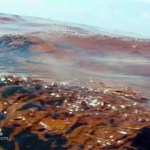underwater plumes
Recently, I wrote a cranky little post about NOAA's behavior regarding the Gulf of Mexico. The agency's approach seemed to me to be timid and deferential at a time when I wanted a strong voice and and steady sense of purpose.
What had set me off was the agency's reluctance to use the word "plume" in describing the underwater mists of oil drifting away from the BP disaster site. Why not, I asked, call a plume a plume?
To my surprise, I almost immediately got a call from NOAA. For some reason, people at the agency didn't agree with my analyses. I thought they were being wusses. They thought…
I was on the phone this afternoon with a friend at what I'll describe as a highly respected national-type newspaper, and we almost simultaneously broke into complaint about the National Oceanic and Atmospheric Administration (NOAA).
What set us off was NOAA's grudging admission of the day, that despite angry earlier denials, there were indeed swathes of oil-saturated water coiling for miles, under the surface of the Gulf, emanating away from the site of the BP pipe break.
As The New York Times noted: "the tests confirmed that some toxic compounds that would normally be expected to…
(Just a note: The giveaway period for the audiobook of The Poisoner's Handbook has ended. If your comment is not published, it's too late to be considered for a free copy. But still glad to hear your ideas! Winners to be notified on Wednesday).
One of the most interesting - and I think important - comment threads on this blog has concerned risks posed by the gas methane, blamed (along with BP) for the devastating oil spill in April and still seeping into the water from the broken drill pipe.
"We don't know the composition of the crude oil as it is leaving the well head. This crude is…
So, at a Sunday news briefing, British Petroleum's CEO, Tony Hayward, announced that there are no underwater plumes of oil resulting from the April accident at the company's Deepwater Horizon rig in the Gulf of Mexico.
Why? Well, first BP's testing hasn't found any such evidence. And second, Hayward reminds us that, you know, oil floats. Or if we didn't get that: "Oil has a specific gravity that's about half that of water. It wants to get to the surface because of the difference in specific gravity."
Let's give the man this: there is definitely oil floating on the surface…

